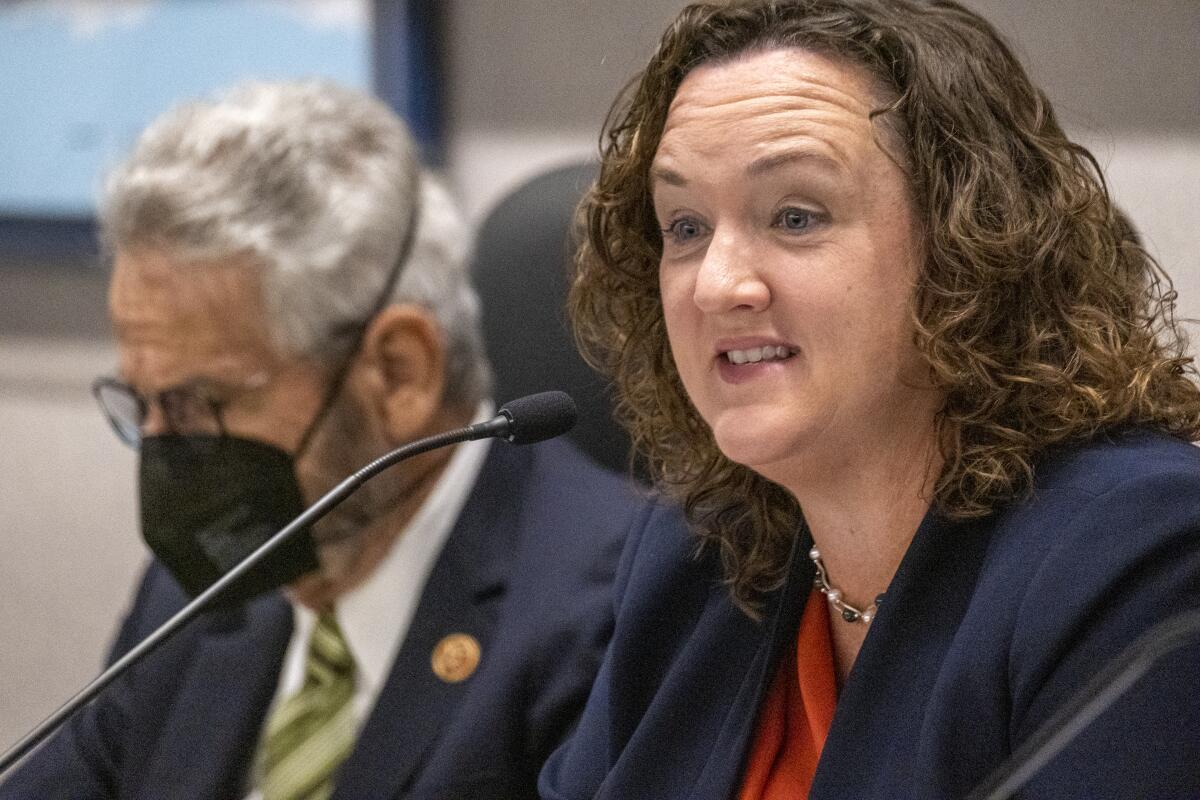Oil company at center of Orange County spill received millions in federal relief

The energy company at the center of a massive oil spill off the Orange County coast has received roughly $31 million in federal relief since 2016, Rep. Katie Porter (D-Irvine) said during a congressional subcommittee hearing on Monday.
Oil and gas companies pay royalties to the government in exchange for leases on federal property. The government sometimes reduces the amount of those royalties.
Beta Offshore, a subsidiary of Amplify Energy, received a $20-million “end of life” royalty discount for two years starting in July 2016 because its wells were close to being tapped dry and were no longer producing as much oil, Porter said.
The company operates the ruptured San Pedro Bay Pipeline, which sent an estimated 25,000 gallons of oil into the waters off Orange County this month.
In June 2020, Beta Offshore received another royalty discount, this time because it planned to drill four new wells, Porter said.
The “special case” discount granted by the Bureau of Safety and Environmental Enforcement will cut the company’s royalty payment by roughly $11 million on drilling operations off the Orange County coast through 2022.
The discount would enable the company to generate additional revenue of about $7 million per year, Amplify officials have predicted.
The company also received a $5.5-million Paycheck Protection Program loan in 2020 that was later forgiven.
“These subsidies and so many others are reasons that oil wells like the ones behind this leak are still active,” Porter said. “Getting rid of the subsidies is the first step to get rid of the problem.”
Monday’s hearing of the House Subcommittee on Energy and Mineral Resources and the Natural Resources Subcommittee on Oversight and Investigations was called to discuss the effects of this month’s oil spill on the environment and local economy.
Porter said during the hearing that she received the information about the royalty relief from the Department of the Interior when she inquired about the type of subsidies Beta Offshore received from the federal government.
Subsidies to fossil fuel producers are not uncommon, experts say.
Between 2010 and 2018, these subsidies averaged $62 billion annually and accounted for about 18% of median oil and gas producer net income in the United States, according to a study published in the Proceedings of the National Academy of Sciences this year by Matthew Kotchen, a Yale University professor.
In a statement, an Amplify Energy spokesperson said Monday that savings from the royalty relief would be invested in O.C. drilling operations and would “help facilitate additional production and revenue for the Federal government.”
In Southern California, Amplify operates two platforms, Ellen and Eureka, which are equipped with drilling rigs and other equipment.
On a third platform, Elly, the raw material is separated into oil, water and gas. The oil is then pumped through a 17.5-mile pipeline to the Port of Long Beach.
Officials suspect a large container ship dragged its anchor during heavy winds on Jan. 25 and struck that undersea pipeline. It is not clear when oil began leaking, and investigators are continuing to probe the incident.
The initial strike may have moved the pipeline without breaking it. Another collision, or possibly a geological event, could have either “increased the fracture or caused the whole thing,” triggering the spill earlier this month, said U.S. Coast Guard Capt. Jason Neubauer.
Investigators from the U.S. Coast Guard boarded the cargo vessel MSC Danit on Saturday in Long Beach. Officials suspect that ship could be responsible for the initial damage to the pipeline. MSC Danit’s owners have not responded to requests for comment.
The Orange County spill has put the nation’s oil and gas infrastructure under scrutiny. Some lawmakers and environmental advocates have called for prohibiting all future offshore drilling, while others want to extend the ban to companies already operating in state and federal waters.
No new offshore oil drilling has been approved in federal waters off the state coastline since 1984.
The Trump administration in 2018 proposed to open offshore oil and natural gas reserves, including those in the waters off California, for exploration.
In response, California — along with New Jersey, Delaware, New Hampshire and some other coastal states — passed laws blocking new oil and gas pipelines from being built on state lands.
Rep. Alan Lowenthal (D-Long Beach) said officials must continue to prohibit new offshore drilling and work toward winding down oil production off the coast.
“This is not a novel threat to us,” he said during Monday’s hearing. “Time and again, Californians have suffered at the hands of offshore drilling.”
More to Read
Sign up for Essential California
The most important California stories and recommendations in your inbox every morning.
You may occasionally receive promotional content from the Los Angeles Times.












